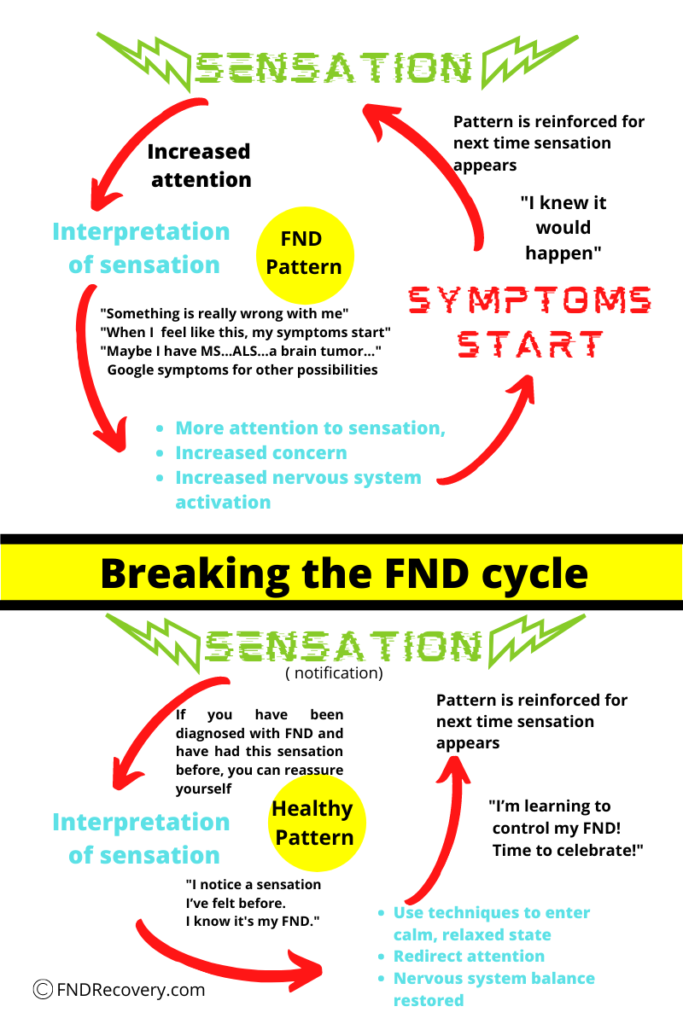The Problem with Attention

The Problem with Attention
Back when we were young and in school, we were often told to pay more attention. It’s easy to get distracted and most of the time more focus helps us learn. For those of us with Functional Neurological Disorder, paying too much attention may actually make our symptoms worse.
We may over focus on new strange sensations or on the abnormal movements we make. I remember when I first started having problems walking and was hospitalized. The neurologist breezed in the room, casually told me to try not to think about it, then discharged me without any further instructions. He said it would probably go away. No diagnosis, no explanation, no treatment.
I was furious and terrified! What was I supposed to do? What was going to happen to me? Was I permanently disabled now? Why? How could he just throw me out without any help? I couldn’t begin to understand why I was being dismissed so casually in the face of disabling symptoms. I felt totally abandoned and confused.
Part of why I was treated that way was because most doctors don’t know what to do with us. They recognize when they examine us that our symptoms don’t make sense. Sometimes that may lead them to believe that we are making them up. Functional Neurological Disorder symptoms don’t adhere to the normal physiologic rules that govern our bodies. As a physician assistant, I was aware that my symptoms didn’t add up. I once told my primary neurologist, who was kind and compassionate even if she didn’t know what to do with me either, that if I was making up my symptoms, I could do a more convincing job. I recognized the inconsistencies in what was happening in my body. If you are reading this and treat patients with FND, I promise you, our symptoms are very real. We aren’t making anything up. Please treat us with the compassion that we deserve. If you have FND, I assure you, this disorder is real and it’s not your fault.
Although he was infuriating, the neurologist in the hospital was sort of right. By focusing on the sensations of weakness, I was making it harder to overcome them. Of course it’s totally normal to focus on something that is going so drastically wrong. How do you adjust to sudden disability?
With time and practice, I’ve learned to change the way I think about symptoms. By changing my thinking, I’ve learned to overcome my disability. Our FND symptoms can be overpowering. We aren’t making them up. We may not feel anxious or stressed, as we are so often told. It might not be possible to fully understand what is going on in our brains at this point, but that doesn’t mean that we are helpless.
Many people with FND talk about their “triggers”, situations that they know will cause symptoms or sensations they associate with symptoms. Lately I’ve thought about these signals more as “notifications”. That term is much more neutral than “trigger”. Just like you can get a notification on your phone when someone is sending you a message, your body also can notify you that there is a message it wants you to address.
Changing our interpretation of what has previously led to symptoms can ultimately prevent symptoms from starting. I now think of any sensation that I used to consider a warning to be my body’s way of letting me know there is something that I need. Sometimes I need something simple, like food, water, or rest. Some of my needs are more complicated- the need to identify and feel an emotion, the need for human connection, the need for a change in a relationship. Some of the messages our body is sending us can be a bit difficult to recognize.
Even if you have no hints of a psychological problem, a skilled therapist can be very helpful in learning to unearth some of these deep, complicated issues. It concerns me when a mental health professional dismisses the possibility of an FND diagnosis. My first therapist wasn’t convinced that I had Conversion Disorder/Functional Neurological Disorder. I seemed so emotionally healthy and knew all of the right things to say. It didn’t make sense to me either. However, we all have distortions in our thinking. It’s a part of being human. Learning to address some of our deep issues can be challenging, but it is also transformative.
Early in my journey with Functional Neurological Disorder, the things I did and told myself reinforced the abnormal patterns my brain had developed. A symptom or sensation would lead to thoughts of “Something is seriously wrong with me!”. The more I thought about my symptoms and the more I researched them trying to understand what was happening, the more my nervous system overreacted.
If you have been diagnosed with FND and notice those old sensations creeping in, try a different approach. It’s not easy and like any new habit you are trying to establish, it takes practice. First, notice the sensation and think of it as your body communicating with you. Do you have a need? If so, try to fulfill that need as soon as possible. If nothing is coming to mind, move on to reassuring yourself. Remember that you have felt this before, it is your FND, and the sensation will pass. Try distraction to help your brain focus away from the sensation. I like to do things that are active to use my brain’s full attention- knitting, crocheting, going for a walk, playing with my dogs… Even if movement is a problem for you, move what you can. Play some energizing music and dance with whatever body parts will cooperate with you. Focus on what you CAN do, not on what you can’t.
Many times I need to calm my nervous system when symptoms seem to threaten. A warm bath, a massage, yoga, a guided meditation, writing in my journal, talking to a friend (and not about FND!), a nap- these are all helpful tools to bring my nervous system back into balance.
If you are experiencing a new symptom, I encourage you to contact your physician. People with FND can develop other illnesses as well. We deserve to be treated with respect and have any new symptom investigated. Some physicians may be too hasty to attribute every symptom we experience to our Functional Neurological Disorder. Unfortunately, you or a family member may have to be prepared to advocate for your health. You can be respectful, but firm. Acknowledge your FND, be clear that this is a new symptom, voice any specific concerns you have, and ask for further explanation if the diagnosis doesn’t make sense to you. Be aware that FND can morph into new symptoms, but don’t dismiss everything as FND until it has been evaluated. This is one of many fine lines we have to walk with Functional Neurological Disorder.
Wishing you the best as you learn to take back control,


Thank you Max. It feels like you wrote this, whilst knowing me! I have spent so much time feeling worried, thinking that the professionals I have seen and the MRIs I have had, have missed something…that they haven’t really understood. I walk into those appointments looking fairly normal and I pass all the physical tests for strength and movement. They don’t see how some muscles in my foot and leg feel stuck together or don’t work, the dysfunctional feeling, or how other days they all just feel like jelly and then they can’t feel the pain. It is because of their not seeing which has actually led me to look more, to look for clues and google the cyclical nature of my affliction! It clearly has got me nowhere. My distraction projects are good ( I sew and paint) because they give my over-focused mind a different problem to ponder upon! I do find it hard to tune into my mind or body’s needs as you suggest…unless it is simply screaming pain or tiredness….eg. whether to walk or not to walk despite the dysfunction…especially when the walking itself brings on the focus!
It’s definitely challenging to learn to not over focus, Elaine. I also agree that it would help if we felt more understood when we looked for help for our symptoms. We aren’t imagining them, but sometimes they don’t mean what we are worried they mean.
When I started my blog, I had no idea if the things I felt were unique to me or if others with FND felt the same. It has meant a lot to me that other people have said my descriptions resonate with them also. Isn’t it nice to know we aren’t alone?
All the best,
Max
Been doing this with the symptoms of all my diseases and disorders. Once I know a cause whether Lupus or FND or fused discs I just say – know where this is from, this is what I need to do – cold pack, stretching – and keep going.
Good for you, Kathy! I believe the less power we give our symptoms, whatever the cause, the less they will overwhelm us. It’s not easy to take them in stride, but acceptance of what we are experiencing in the moment helps us suffer less.
All the best,
Max
Hi Maxanne, thank you so much for writing this blog. I am very grateful to have found this. Your words resonate completely. I am lucky enough to live in Edinburgh and Prof. Stone is my Consultant. I have been diagnosed with FND most likely to be as a result of supressed grieve and PTSD and for the last year I have been having many symptoms including CFS, ongoing abnormal facial movements, nose scrunching, mouth, eye movements, now affecting my speech and eating. The ongoing fighting this non automatic movement and non stop focusing on it has been a massive struggle for me. Reading your blog is helping me so much, knowing I am not alone. Knowing that managing and healing is truly possible is really helping me. Thank you thank you thank you for writing this :-). x
Awww, Cherylin, your comment makes my heart so happy! You are definitely not alone! I’m so happy that you have the world’s expert on FND as your consultant. Wishing you all the best as you learn to manage your FND!
I think I have been diagnosed with fnd, but why isn’t there anyone contacting me, why am I the that has to reach out for help even if anyone does get me help,my doctor, the help is still slow, its disgusting sitting at home with no help during the day,I have family at night as they work, but I feel as if my disorder isn’t serious enough for help,thanks for reading.
Hi John,
I’m so sorry you are being treated this way. Unfortunately, it’s all too common with FND. You deserve help and support. Resources you can check out are neurosymptoms.org and fndhope.org. I hope that you find help soon.
Max
I’m so happy I found your you tube video that brought me here. so helpful thank you.
It’s like you know what I’m going through and the doctors don’t care and tell me to get on with it, but I can’t when I can’t move. it’s so depressing.
how can you distract yourself when walking when you leg just so tense it just won’t move?
do you have any tips or post for this please?
Hi Clare,
Thank you for your kind comment. I’ve been delaying my reply so that I can share with you my latest blog post. You were on my mind as I wrote it! I hope that you find it helpful. Distraction- the key to automatic normal function
All the best,
Max